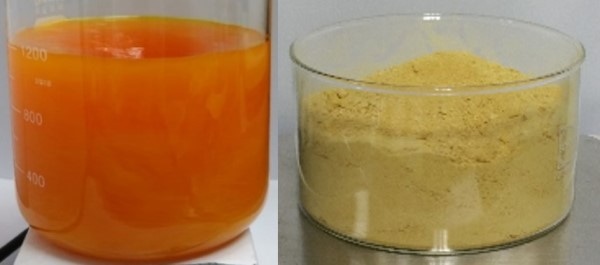Aug 12 2019
Scientists have synthesized plastic-based materials that can make large-scale, profitable, and safe natural gas storage possible and can further hopefully combat global warming.
 Initial ingredients (left) and final product (right) of COP-150 synthesis (Image credit: KAIST)
Initial ingredients (left) and final product (right) of COP-150 synthesis (Image credit: KAIST)
Natural gas (mostly methane) is a clean energy substitute that can be stored by liquefaction, compression, or adsorption. Of the three, adsorbed natural gas (ANG) storage is the more efficient, cost-effective, and safer alternative to traditional liquefied natural gas (LNG) and compressed natural gas (CNG) storage methods that have disadvantages such as high costs, low storage efficiency, and safety concerns.
It is challenging, however, to develop adsorptive materials that are capable of completely leveraging the advantages of ANG storage.
A research group at KAIST under the leadership of Professor Cafer T. Yavuz from the Graduate School of Energy, Environment, Water, and Sustainability (EEWS), together with Professor Mert Atilhan’s team from Texas A&M University, developed 29 exclusive porous polymeric structures with intrinsic flexibility and analyzed their methane gas uptake capacity at increased pressures.
All such porous polymers had diverse porosities, synthetic intricacies, and morphologies. The team exposed each porous polymer to pure methane gas under different conditions to determine the performances of the ANG.
In particular, COP-150 is a most significant structure among the 29 well-defined chemical structures owing to its high deliverable gravimetric methane working capacity when cycled from 5 to 100 bar at 273 K, which is 98% of the total uptake capacity. This result outperformed the desired result set by the United States Department of Energy (U.S. DOE).
COP-150 is the very first structure to meet the volumetric and gravimetric requirements of the U.S. DOE for successful vehicular use. The total cost to synthesize the COP-150 adsorbent was only US$1/kg.
Using readily available and easily accessible plastic materials, COP-150 can be synthesized at ambient temperature in the open air, and prior chemical purification is not needed. COP-150’s pressure-activated flexible structure is also beneficial with respect to the total working capacity of deliverable methane for actual applications.
The scientists hope that the increased pressure can bend the network structure of COP-150 exhibiting “swelling” behavior and proposed that the flexibility can offer heat management and quick desorption, whereas the covalent bond nature of the framework and the hydrophobicity enable these potential materials to withstand severe conditions.
They also observed that this swelling process of contraction and expansion can solve two other important issues. First, when adsorbents based on such a mechanism are used, unsafe pressure spikes that might occur owing to temperature fluctuations can be prevented, and second, contamination can be reduced, as the adsorbent remains contracted when there is no gas in storage.
We envision a whole host of new designs and mechanisms to be developed based on our concept. Since natural gas is a much cleaner fuel than coal and petroleum, new developments in this realm will help switching to the use of less polluting fuels.
Cafer T. Yavuz, Professor, Graduate School of Energy, Environment, Water, and Sustainability, KAIST
Professor Atilhan concurred that the study had the most crucial effect on the environment: “Using natural gas more than coal and petroleum will significantly reduce greenhouse gas emissions. We believe, one day, we might see vehicles equipped with our materials that are run by a cleaner natural gas fuel.”
This work, published in Nature Energy on July 8th, 2019, was supported by National Research Foundation of Korea (NRF) grants (NRF-2016R1A2B4011027, NRF-2017M3A7B4042140, and NRF-2017M3A7B4042235).